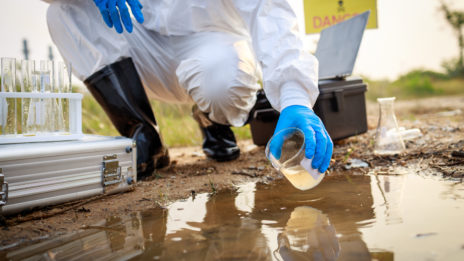Hazardous Per- and Polyfluoroalkyl Substances (PFAS Pollutants) are a group of manufactured chemicals that are often off gassed by industrial manufacturing processes, and which contaminate consumer products. PFAS pollutants can…
Environmental FAQs | McCune Law Group
Environmental law plays a vital role in protecting our communities, natural resources, and public health from harmful practices and pollution. From toxic waste and air contamination to unsafe water supplies and unlawful land development, environmental violations can have devastating consequences for individuals, neighborhoods, and ecosystems.
This Environmental FAQ page offers answers to common questions about environmental matters. Whether you’re concerned about contamination near your home or seeking justice for a community-wide environmental hazard, understanding your legal options is the first step toward meaningful action. If you have a question that’s not addressed here, contact us directly for a free evaluation.
Frequently Asked Questions
What are common types of environmental law violations?
Environmental law violations can take many forms, depending on the type of pollution or regulatory failure involved. Some of the most common violations include illegal dumping of hazardous waste, contamination of groundwater or soil, air pollution from industrial facilities, improper storage of toxic materials, and failure to comply with environmental regulations such as the Clean Air Act or Clean Water Act. In many cases, these violations can cause long-term harm to nearby communities, ecosystems, and public health.
Who can be held legally responsible for environmental damage?
Responsibility for environmental damage can lie with a variety of parties, including private corporations, manufacturers, developers, government agencies, and even individual landowners. Liability often depends on who caused the pollution or failed to comply with environmental regulations. In some cases, multiple parties may share responsibility. For example, if a factory improperly disposes of chemical waste and a regulatory agency fails to enforce environmental standards, both entities may be liable.
What are my legal rights if I’ve been affected by environmental pollution?
If you or your community has suffered health problems, property damage, or financial loss due to environmental pollution, you may have the right to seek compensation through an environmental lawsuit. These legal actions can pursue damages for medical expenses, loss of property value, cleanup costs, and emotional distress. In some cases, courts may also issue injunctive relief to stop ongoing pollution or force the responsible party to remediate the damage. Depending on the circumstances, you may also be able to join a class action lawsuit with others affected by the same environmental issue. An experienced environmental attorney can help assess your case and determine the most effective legal strategy.
How do I know if I’m eligible to file an environmental lawsuit?
Eligibility to file an environmental lawsuit generally depends on whether you’ve suffered a direct and measurable impact from an environmental violation—such as health complications, property damage, or loss of use and enjoyment of your land. If you live or work near a contaminated site, industrial facility, or polluted waterway, you may be entitled to legal recourse. These cases often require evidence such as medical records, environmental studies, or expert testimony to prove causation and damages. Because environmental claims can be complex and time-sensitive, it’s important to consult a knowledgeable attorney who can guide you through the legal process and protect your rights.
Still have questions about your environmental case? Contact McCune Law Group today at (909) 345-8110, or fill out our online form for a free evaluation — we are here to help you protect your rights and recover the compensation you deserve.
